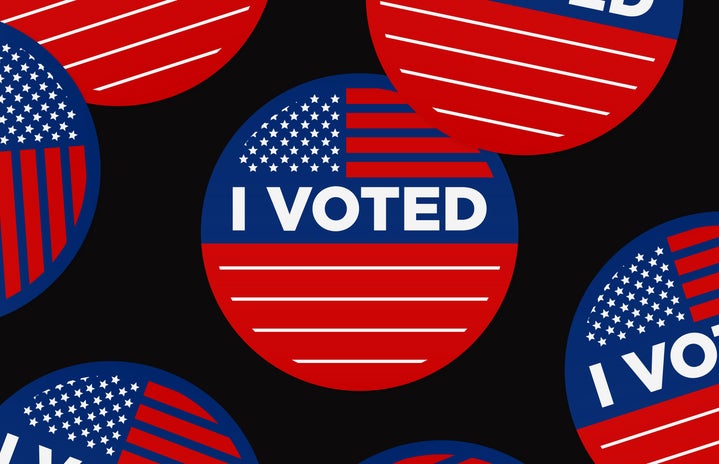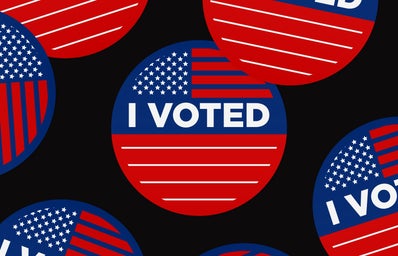Gender Gap Among Young Voters Proved Decisive in Trump Election Victory
MANHATTAN, New York—The presidential race between former President Donald Trump and Vice President Kamala Harris was more than a ballot exercise for Maggie Kocsmiersky. It was an emotional affair for the 19-year-old advertising and marketing communications major at the Fashion Institute of Technology (F.I.T.) in New York City. She had made up her mind early in the race, even though the candidates changed midway.
“Just on character, I would never vote for Donald Trump, regardless of whoever was on the other platform,” Kocsmiersky said. “I saw what he ran on in 2016. I saw what he did in office.”
“I was going to vote for Joe Biden when he was still in the race,” she added. “And then when Kamala Harris joined the race, I actually became excited to vote for Kamala Harris. But either way, I was going to vote for whoever wasn’t Trump.”
Bedros Maldjian, 20, a music major at Princeton University in New Jersey, had a completely different take on the race as he cast his first presidential ballot on Nov. 5. He was motivated by the tax plans of the candidates to cast his vote for Trump.
“I chose Trump for president, and I voted for all the Republicans in my district. It really wasn’t that difficult for me,” Maldjian said. “My main issue is taxes, and the Republicans want to lower taxes for a majority of people while the Democrats tend to want to raise taxes.”
“So just based on taxes alone, it was a very easy decision for me to vote Republican,” he added. “As someone in the middle class and most of my family is middle class, I want to support them, support my future family by lowering the taxes for the middle class.”
“We had Trump for four years. We had Biden for four years,” Maldjian said. “And people said, you know what? We messed up. Let’s go back to Trump.”
The different viewpoints between Kocsmiersky and Maldjian were typical for Generation Z voters, those born between 1997 and 2012, in this presidential election. According to Tufts University’s Center for Information & Research on Civic Learning and Engagement (Circle) which studies young people’s civic engagement, the youth vote was sharply split among gender lines. While young women favored the Democratic candidate by 17 percentage points, young men favored the Republican candidates by 14 points.
Especially young white men and Latino men favored Trump, while young Black and Asian women favored Harris, according to Circle. Overall, young voters supported Harris much less than they had supported President Joe Biden four years ago, making the youth vote inroads a decisive factor for Trump’s election victory.
Gen Z voters were driven by the topics that they deemed important for their own future and that ranged from the war in Gaza and economic prosperity to reproductive rights and the future of American democracy. Not all young voters who cast their ballots for Kamala Harris did so with enthusiasm.
Kashvi Ramani, 18, a first year drama major at New York University, voted primarily on abortion rights, queer rights and advocacy for gay marriage.
“I’ve been following politics for most of my life despite only being able to vote in this election. And I come from an area that’s pretty conservative in Virginia. I think that’s the reason why I knew who to vote for from the beginning,” she said. “As soon as the candidates came out and Biden stepped down, I knew I wanted to vote for Kamala because she is the type of candidate that would best represent people of my culture because I’m Indian.”
“And a lot of her policies align with my personal beliefs and goals. And because I was surrounded by people that represent what I didn’t want in our country, it was the only way to represent what I want,” she added. “A lot had to do with just immigration policies because my family are immigrants and it’s a really crucial issue on the ballot.”
Julieta Seleme, 19, a second year fashion business management major at F.I.T., said that abortion and reproductive rights were decisive topics for her to cast her vote for Harris.
“I’m not a fan of Donald Trump as a person and also as a candidate. I don’t align with his policies and his belief system, especially when it comes to immigration,” she said. “As a Latina voter, I just felt like I could not vote for him and put my values and my family aside and vote for him. So that was kind of my reasoning for voting for Kamala.”
“But I was definitely on the fence, especially with the war in Gaza. I didn’t feel comfortable supporting her. I also wasn’t that excited to vote for her,” she added. “I was thinking of voting for [Green Party candidate] Jill Stein. However, I honestly got scared. I started seeing a lot of stuff, especially after seeing the rally [in Madison Square Garden]. I was like, maybe I didn’t know how safe New York would be even though it’s a safe blue state.”
But some Gen Z voters were so dissatisfied with the two major parties that they decided to cast their votes for third-party candidates. Adrian Rafizadeh, 23, a finance major at the University of Pennsylvania, voted for a Libertarian third-party candidate because he did not feel represented by the platforms of Trump and Harris.
“It was not an easy choice,” he said. “I think neither of the two major party candidates earned my vote. So I ended up voting for a third party. I voted for the libertarian candidate for president. That was the one who I felt best aligned with my values and that I could feel comfortable voting for in the end.”
“I think each candidate was both uniquely strong or weak on all those issues,” he added. “I think on immigration, the Biden Harris administration has shown to be weak. I think on the idea of American democracy, I have very strong concerns of what a Trump presidency would mean for that.”
I think I would not want to see a weaponization of the Department of Justice. I wouldn’t want to see a revenge tour from Donald Trump. I would not want to see any effort whatsoever for him to try and stay in office past his four years.
Adrian Rafizadeh, 23, a finance major at the University of Pennsylvania
Rafizadeh fears that there could be a threat to American institutions in the federal government. “I think I would not want to see a weaponization of the Department of Justice. I wouldn’t want to see a revenge tour from Donald Trump. I would not want to see any effort whatsoever for him to try and stay in office past his four years. Those things definitely very much scare me. I would hate to see further demonization of the LGBTQ community. I would hate to see any further rolling back of reproductive rights,” he said.
For Harris voter Kocsmiersky and Trump voter Maldjian the outlook on the next four years could not be more contrasting. While Kocsmiersky is full of fear of what is to come under the Trump Administration, Maldjian believes that Trump will fulfill his promise to “make America great again.”
“I think everybody’s gonna be mad,” Kocsmiersky said. “I think everybody’s going to be experiencing increased prices on everything. The whole platform was like we’re going to bring your cost of groceries down. And then they’re adding tariffs, which bring the costs up. So I think everybody’s gonna be mad.”
She added that “I know Trump and I know his policies, and that alone is scary. He’s very anti-everything that I’m pro for. But then there’s another fear that he has such a cult following and his rhetoric is so hateful.”
Maldjian, on the other hand, expects an economic boom in the next four years. “I think the economy is going to be doing much better. I think the unemployment rate is going to go down significantly. That’s what I’m looking forward to,” he said. “I think people are going to realize that Trump is not a good person. I think anyone with two brain cells can figure that out.”
I didn’t vote for him to be my sister’s husband. I voted for him to run the country.
Bedros Maldjian, 20, a music major at Princeton University
“But here’s the thing: he makes a good president. That’s the thing,” Maldjian added. “I didn’t vote for him to be my sister’s husband. I voted for him to run the country. And at that he could do a good job.”



